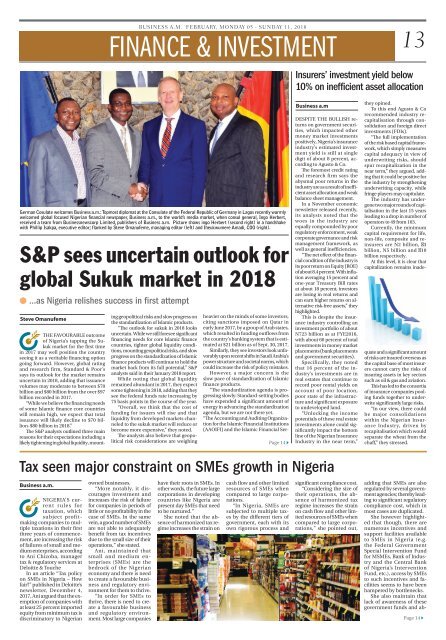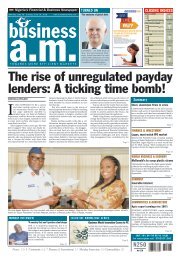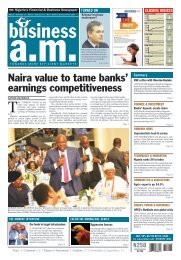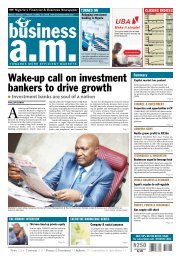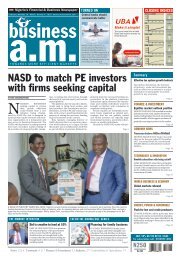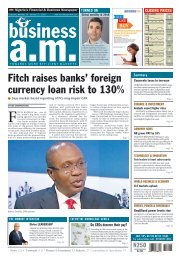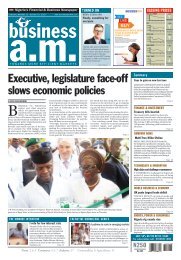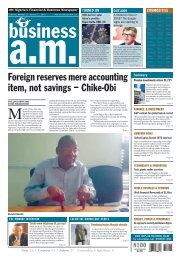You also want an ePaper? Increase the reach of your titles
YUMPU automatically turns print PDFs into web optimized ePapers that Google loves.
BUSINESS A.M. FEBRUARY, MONDAY <strong>05</strong> - SUNDAY 11, 20<strong>18</strong><br />
FINANCE & INVESTMENT<br />
13<br />
Insurers’ investment yield below<br />
10% on inefficient asset allocation<br />
German Cosulate welcomes Business a.m.: Topmost diplomat at the Consulate of the Federal Republic of Germany in Lagos recently warmly<br />
welcomed global focused Nigerian financial newspaper, Business a.m., to the world’s media market, when consul general, Ingo Herbert,<br />
received a team from Businessnewscorp Limited, publishers of Business a.m. Picture shows ingo Herbert (second right) in a handshake<br />
with Phillip Isakpa, executive editor; flanked by Steve Omanufeme, managing editor (left) and Iheukwumere Amadi, COO (right).<br />
S&P sees uncertain outlook for<br />
global Sukuk market in 20<strong>18</strong><br />
...as Nigeria relishes success in first attempt<br />
Steve Omanufeme<br />
THE FAVOURABLE outcome<br />
of Nigeria’s tapping the Sukuk<br />
market for the first time<br />
in 2017 may well position the country<br />
seeing it as a veritable financing option<br />
going forward. However, global rating<br />
and research firm, Standard & Poor’s<br />
says its outlook for the market remains<br />
uncertain in 20<strong>18</strong>, adding that issuance<br />
volumes may moderate to between $70<br />
billion and $80 billion from the over $97<br />
billion recorded in 2017.<br />
“While we believe the financing needs<br />
of some Islamic finance core countries<br />
will remain high, we expect that total<br />
issuance will likely decline to $70 billion-$80<br />
billion in 20<strong>18</strong>.”<br />
The S&P analysts outlined three main<br />
reasons for their expectations including a<br />
likely tightening in global liquidity, mount-<br />
ing geopolitical risks and slow progress on<br />
the standardization of Islamic products.<br />
“The outlook for sukuk in 20<strong>18</strong> looks<br />
uncertain. While we still foresee significant<br />
financing needs for core Islamic finance<br />
countries, tighter global liquidity conditions,<br />
mounting geopolitical risks, and slow<br />
progress on the standardization of Islamic<br />
finance products will continue to hold the<br />
market back from its full potential,” S&P<br />
analysts said in their January 20<strong>18</strong> report.<br />
While noting that global liquidity<br />
remained abundant in 2017, they expect<br />
some tightening in 20<strong>18</strong>, adding that they<br />
see the federal funds rate increasing by<br />
75 basis points in the course of the year.<br />
“Overall, we think that the cost of<br />
funding for issuers will rise and that<br />
liquidity from developed markets channeled<br />
to the sukuk market will reduce or<br />
become more expensive,” they noted.<br />
The analysts also believe that geopolitical<br />
risk considerations are weighing<br />
heavier on the minds of some investors,<br />
citing sanctions imposed on Qatar in<br />
early June 2017, by a group of Arab states,<br />
which resulted in funding outflows from<br />
the country’s banking system that is estimated<br />
at $21 billion as of Sept. 30, 2017.<br />
Similarly, they see investors look unfavorably<br />
upon recent shifts in Saudi Arabia’s<br />
power structure and societal norms, which<br />
could increase the risk of policy mistakes.<br />
However, a major concern is the<br />
slow pace of standardization of Islamic<br />
finance products.<br />
“The standardization agenda is progressing<br />
slowly: Standard-setting bodies<br />
have expended a significant amount of<br />
energy in advancing the standardization<br />
agenda, but we are not there yet.<br />
“The Accounting and Auditing Organization<br />
for the Islamic Financial Institutions<br />
(AAOIFI) and the Islamic Financial Ser-<br />
Page 14<br />
Business a.m<br />
DESPITE THE BULLISH returns<br />
on government securities,<br />
which impacted other<br />
money market investments<br />
positively, Nigeria’s insurance<br />
industry’s estimated investment<br />
yield is still at single<br />
digit of about 8 percent, according<br />
to Agusto & Co.<br />
The foremost credit rating<br />
and research firm says the<br />
abysmal poor returns in the<br />
industry are as a result of inefficient<br />
asset allocation and weak<br />
balance sheet management.<br />
In a November economic<br />
newsletter released recently,<br />
its analysts noted that the<br />
woes in the industry are<br />
equally compounded by poor<br />
regulatory enforcement, weak<br />
corporate governance and risk<br />
management framework, as<br />
well as general inefficiencies.<br />
“The net effect of the financial<br />
condition of the industry is<br />
its poor return on Equity (ROE)<br />
of about 8.4 percent. With inflation<br />
averaging 15 percent and<br />
one-year Treasury Bill rates<br />
at about <strong>18</strong> percent, investors<br />
are losing in real returns and<br />
can earn higher returns on alternative<br />
risk-free assets,” they<br />
highlighted.<br />
This is despite the insurance<br />
industry controlling an<br />
investment portfolio of about<br />
N723 billion as at FYE2016,<br />
with about 60 percent of total<br />
investments in money market<br />
placements (bank placements<br />
and government securities).<br />
Specifically, they noted<br />
that 16 percent of the industry’s<br />
investments are in<br />
real estates that continue to<br />
record poor rental yields on<br />
account of poor location,<br />
poor state of the infrastructure<br />
and significant exposure<br />
to undeveloped land.<br />
“Unlocking the income<br />
potentials of these real estate<br />
investments alone could significantly<br />
impact the bottom<br />
line of the Nigerian Insurance<br />
Industry in the near term,”<br />
they opined.<br />
To this end Agusto & Co<br />
recommended industry recapitalisation<br />
through consolidation<br />
and foreign direct<br />
investments (FDIs).<br />
“The full implementation<br />
of the risk based capital framework,<br />
which simply measures<br />
capital adequacy in view of<br />
underwriting risks, should<br />
spur recapitalization in the<br />
near term,” they argued, adding<br />
that it could be positive for<br />
the industry by strengthening<br />
underwriting capacity, while<br />
fringe players may capitulate.<br />
The industry has undergone<br />
two major rounds of capitalisation<br />
in the last 15 years<br />
leading to a drop in number of<br />
operators to 49 from 103.<br />
Currently, the minimum<br />
capital requirement for life,<br />
non-life, composite and reinsurers<br />
are N2 billion, ₦3<br />
billion, N5 billion and ₦10<br />
billion respectively.<br />
At this level, it is clear that<br />
capitalization remains inadequate<br />
and a significant amount<br />
of risks are insured overseas as<br />
the capital base of most insurers<br />
cannot carry the risks of<br />
insuring assets in key sectors<br />
such as oil & gas and aviation.<br />
This has led to the consortia<br />
of insurance companies pooling<br />
funds together to underwrite<br />
significantly large risks.<br />
“In our view, there could<br />
be major consolidations<br />
within the Nigerian Insurance<br />
Industry, driven by<br />
recapitalisation which would<br />
separate the wheat from the<br />
chaff,” they stressed.<br />
Tax seen major constraint on SMEs growth in Nigeria<br />
Business a.m.<br />
NIGERIA’S current<br />
rules for<br />
taxation, which<br />
subject profitmaking<br />
companies to multiple<br />
taxations in their first<br />
three years of commencement,<br />
are increasing the risk<br />
of failures of small and medium<br />
enterprises, according<br />
to Ani Chizoba, manager<br />
tax & regulatory services at<br />
Deloitte & Touche<br />
In an article “Tax policy<br />
on SMEs in Nigeria – How<br />
fair?” published in Deloitte’s<br />
newsletter, December 4,<br />
2017, Ani argued that the exemption<br />
of companies with<br />
at least 25 percent imported<br />
equity from minimum tax is<br />
discriminatory to Nigerian<br />
owned businesses.<br />
“More notably, it discourages<br />
investment and<br />
increases the risk of failure<br />
for companies in periods of<br />
little or no profitability in the<br />
case of SMEs. In the same<br />
vein, a good number of SMEs<br />
are not able to adequately<br />
benefit from tax incentives<br />
due to the small size of their<br />
operations,” she stated.<br />
Ani, maintained that<br />
small and medium enterprises<br />
(SMEs) are the<br />
bedrock of the Nigerian<br />
economy and there is need<br />
to create a favourable business<br />
and regulatory environment<br />
for them to thrive.<br />
“In order for SMEs to<br />
thrive, there is need to create<br />
a favourable business<br />
and regulatory environment.<br />
Most large companies<br />
have their roots in SMEs. In<br />
other words, the future large<br />
corporations in developing<br />
countries like Nigeria are<br />
present day SMEs that need<br />
to be nurtured.”<br />
She noted that the absence<br />
of harmonized tax regime<br />
increases the strain on<br />
cash flow and other limited<br />
resources of SMEs when<br />
compared to large corporations.<br />
“In Nigeria, SMEs are<br />
subjected to multiple taxes<br />
by the different tiers of<br />
government, each with its<br />
own rigorous process and<br />
significant compliance cost.<br />
“Considering the size of<br />
their operations, the absence<br />
of harmonized tax<br />
regime increases the strain<br />
on cash flow and other limited<br />
resources of SMEs when<br />
compared to large corporations,”<br />
she pointed out,<br />
adding that SMEs are also<br />
regulated by several government<br />
agencies; thereby leading<br />
to significant regulatory<br />
compliance cost, which in<br />
most cases are duplicated.<br />
She however highlighted<br />
that though, there are<br />
numerous incentives and<br />
support facilities available<br />
to SMEs in Nigeria (e.g.<br />
the Federal Government<br />
Special Intervention Fund<br />
for MSMEs, Bank of Industry<br />
and the Central Bank<br />
of Nigeria’s Intervention<br />
Fund, etc.), access by SMEs<br />
to such incentives and facilities<br />
seems to have been<br />
hampered by bottlenecks.<br />
She also maintain that<br />
lack of awareness of these<br />
government funds and ab-<br />
Page 14


